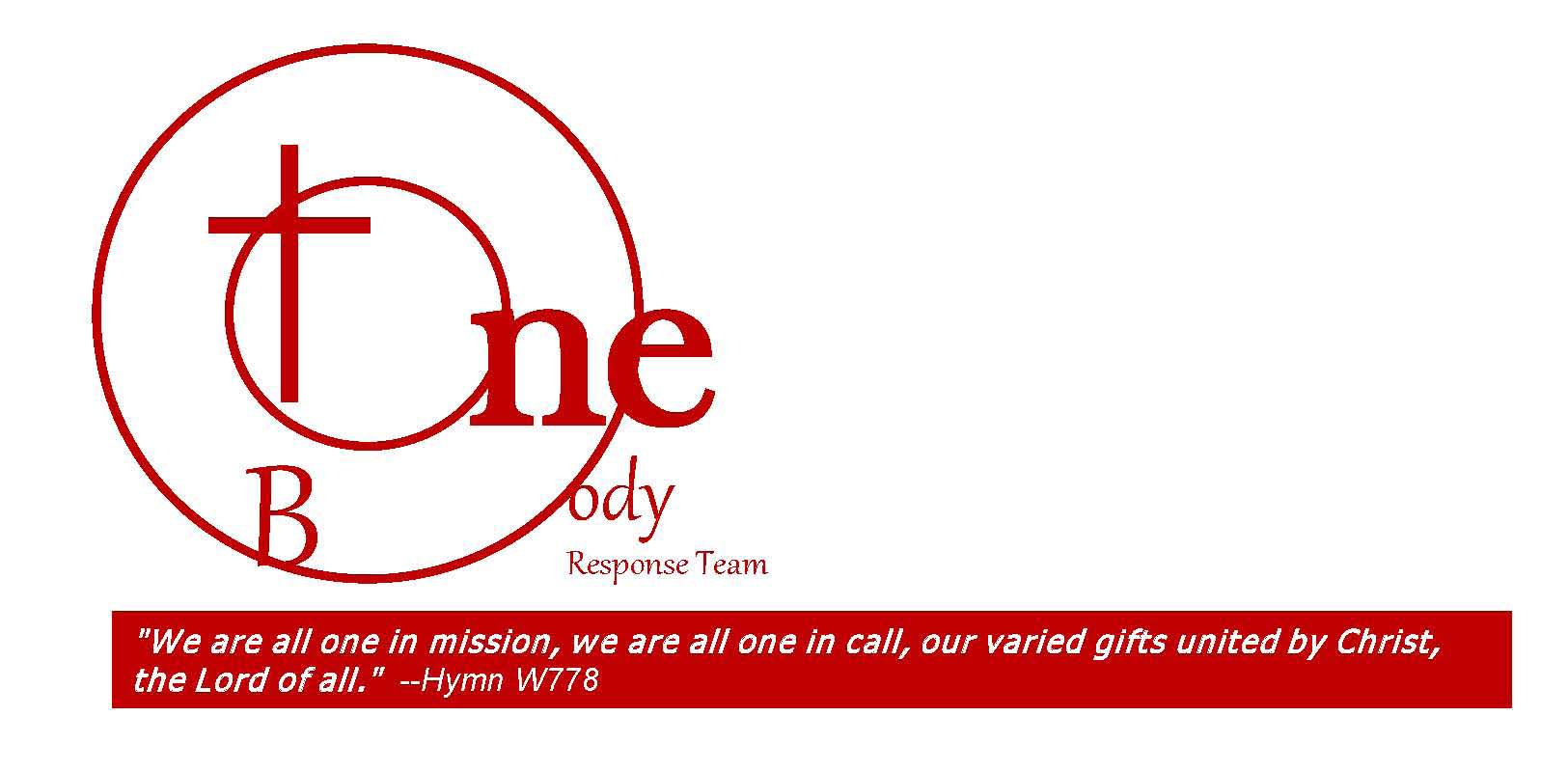 The following is from internal documents on this ministry
The following is from internal documents on this ministry
On March 10, 2010, St. George’s Congregational Care Commission inaugurated a new seventy-member pastoral care initiative called the One Body Response Team (OBRT).
The mission of the Congregational Care Commission is to be intentionally supportive of minds, bodies and spirits of fellow St. Georgians and to support the work of the clergy.
The reason for its creation “Because the current ten-member team found it difficult to meet their commitment to care for one another on a week to week basis, they formed a new initiative, the 75-member One Body Response Team, developed to provide more effective means of carrying out the commission’s objectives.“
Team members are charged with providing the care good neighbors give:
One Body members show they care when they
lend a helping hand in an emergency,
run an errand,
touch base with someone by phone or with a visit,
provide a hot meal,
remember an important anniversary with a card or call,
or transport someone to an appointment or to church, especially during scenarios we now affectionately refer to as Snowmegedons.
How are our members organized to perform their ministry?
One Body members serve one year at a time. Same with captains. Members can renew as often as they like.
The 75 members are divided into 7 ten- member teams headed by a captain.
Organizational Flow-The One Body coordinator oversees the flow of communication regarding parishioner need. Our means of communication is by internet, so all members must be able to access email regularly. Notice of need originates from the clergy and/or the parish admin, Nancy Schwartz, gets funneled to me and I pass it along to the team captains, who in turn pass it along to team members.
Each team is identified by a particular color and is ideally composed of members from as wide a variety of locales as possible so we are able to effectively answer needs coming from a variety of locales.
How often is a team on call?
You and your ten-person team will be on call one week out of every seven. The weeks run from Wednesday to Tuesday. The entire 2011 rotating calendar has been emailed to you, so that you can plan ahead to be available. Captain, get to know your members and their schedules of availability.
Don’t worry. If illness, vacation or unusual demands of work or family prevent you from serving that week, aim to help another time. Captains, same goes for you, if prevented for some reason from serving on a particular week, the program coordinator will temporarily assume the captain’s position for that week.
When your team is on call, it is necessary for members as well as the captain to check email twice a day for seven days, say, once in the morning and once in the evening, to stay on top of needs updates.
We communicate by email almost exclusively, so be sure your captain has the email/emails addresses that you can access anytime, weekday and weekend. Two of our 75 members have no email. Their captains will find it necessary to communicate with them by phone. Those two members should call their captains to check in at least three or four times during their “on call” week to save the captain all the extra steps to communicate.
Once again as coordinator, I will send team members an email to remind you of your upcoming week of duty.
How do we respond when a need arises with a congregant?
At the beginning of a team’s duty week, the captain is notified by the coordinator, via email, with information regarding any parishioner needs. The coordinator continues to update the captain throughout the week if needed.
When needs arise, the captain simply passes along the info to the team members. Ideally, the captain and team members will review the needs list and decide if they can do something that week to meet the need. I f they can volunteer to take action, first they must respond back to the entire team, hitting “send to all” informing all members that they will assume the responsibility for the need. This step is critical in order to avoid duplicating efforts. Of course sometimes, depending on the situation, the coordinator will indicate to the captain that it would be helpful for one or MORE people to contact a parishioner in the same week.
What if no members respond to calls for help? Don’t worry. Just let the coordinator know and she’ll work with clergy to see if we can answer the need.
The member need not report back to the captain once they have taken action unless they wish or have some useful info to share with other members or the clergy or if they think additional action should be taken that week or the following week with the next team. Be sure to communicate directly with clergy if you think a parishioner ‘s situation is worsening or requires professional help.
Remember: The aim of the One Body Team is to support our clergy and serve our community when we can. We will never insist that every need is met.
What we don’t do:
We don’t provide child care or babysitting per say, nursing care, such as dispensing medication, lifting, assisting to the bathroom and other types of patient handling, for obvious reasons. That is the job of professionally licensed health care providers.
We don’t provide spiritual counseling. That is the job of the clergy.
In the case of children, bring another member with you or keep an adult nearby. Depending on the situation, you may want to be in the company of another adult if you are tending to parishioners of the opposite sex.
In our dealing s with fellow St. Georgians, if someone wishes to share worries, fears, unhappiness or grief, we of course encourage you to be good, compassionate listeners and/or companions in prayer if requested by the individuals. Often times a troubled person just needs to know that someone cares, will listen with an unbiased ear and can allow them to unload. This is the time to listen, certainly not talk about ourselves and our own problems. We are simply charged with caring and listening, not talking, not problem solving where interpersonal relationships are involved, but only to validate their feelings, no matter how grim, and to avoid platitudes (“it’s for the best,” “ it’s not as bad as it seems.” etc.) that might make you feel better, but usually makes them feel unheard. We are charged to do no harm.
Whatever we hear or witness in our interactions with congregants, confidentiality is to be strictly maintained.
When you feel a person needs more than you can give, communicate directly with the clergy. In cases of a death in the family, St. George’s has purchased a nice series of booklets that help comfort survivors as they move through the various stages of the grief process. Just contact the coordinator when you know of a congregant who needs a set.
Date all prepared foods-find out about dietary needs of individuals
